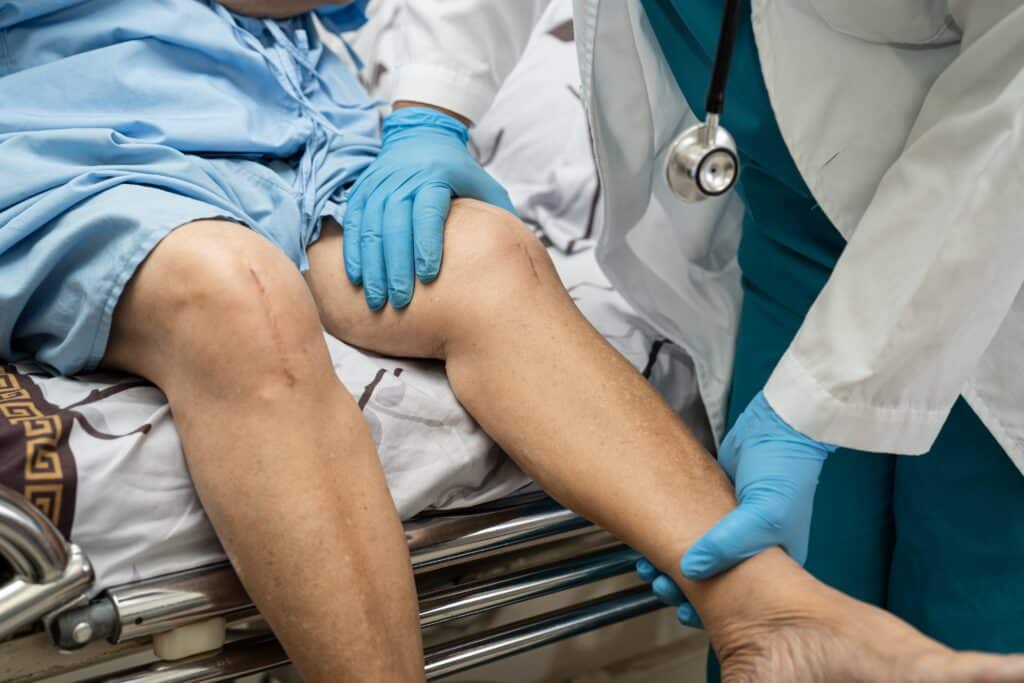Marc Darrow, MD, JD.
This is recent research on knee replacement dissatisfaction. For more information, contact our office using the form below.
Dissatisfaction after total knee arthroplasty is a prevalent and clinically relevant problem that affects approximately 10%-20% of patients

Some patients dissatisfied with their results of their knee replacement
A May 2024 study (1) looked to help doctors predict which patients would be most dissatisfied with their results of their knee replacement (knee arthroplasty ) surgery. The authors write: “Dissatisfaction after total knee arthroplasty is a prevalent and clinically relevant problem that affects approximately 10%-20% of patients. The aim of this study is to identify factors associated with dissatisfaction one year after total knee arthroplasty.
- A total of 236 patients who had total knee arthroplasty (TKA) were included in this prospective cohort study.
- One year after total knee arthroplasty (TKA), 16% of the patients were dissatisfied with the surgery outcome.
- Dissatisfied patients were significantly younger and had a higher body mass index (BMI). Although patients over 63 years old had greater risk for dissatisfaction after surgery.
- Further, greater pain, reduced functionality and unmet expectation 1 month postoperatively lead to greater long-term dissatisfaction.
Unmet expectations may explain post-total knee arthroplasty dissatisfaction.
A May 2024 study (2) found that patients who had a minimal clinically important difference ((MCID) this is the smallest amount of change to the better) in patient-reported outcomes following total knee arthroplasty is common, yet up to 20% patient dissatisfaction persists. Unmet expectations may explain post-total knee arthroplasty dissatisfaction.
- In this study, 93 patients were asked what were their expectations, what did they want from their knee replacement? This question was asked 12 months after the replacement. Using these answers the researchers established baseline goals. Were these goals met?
- When measured against outcomes scores that would signify minimal clinically important difference (MCID) in physical function, patients had twice the expectation of functionality improvement.
- The patients also expected significantly more pain relief than the minimal clinically important difference (MCID) scores.
Because of these outcomes, the researchers concluded: “This discrepancy challenges currently accepted standards of success after total knee arthroplasty and indicates a need for improved expectation setting prior to surgery.”
Dissatisfaction in patients with obesity
A December 2023 study (3) looked at the outcomes of 229 patients (243 total knee replacements) who had Class II or III obesity, and compared outcomes with 287 patients (328 total knee replacement) who had normal weight, overweight, or Class I obesity. It was seen that the more obese patients were younger and had more severe preoperative back and contralateral knee pain, more frequent preoperative opioid medication use. Patients in both groups expected at least 75% improvement in their knee pain and function following the surgery.
The conclusion of this study: “Patients who have Class II and III obesity report greater total knee replacement dissatisfaction. Additional studies should help determine whether specific implant designs or surgical techniques may improve patient satisfaction or whether preoperative counseling should incorporate lower satisfaction expectations for patients who have Class II or III obesity.”
Depression, anxiety and negative attitude may impact knee replacement outcomes
Diminished activity levels after knee replacement and patient dissatisfaction
A December 2023 paper (6) investigated whether preoperative expectations regarding performing work-related knee-straining activities were associated with being dissatisfied 6 months after total knee replacement among working patients.
- 175 working patients who were on the waiting list for total knee replacement (average age 59 years, 53% women) and intended to return to work.
- Thirty-three patients (19%) were dissatisfied with performing work-related knee-straining activities 6 months after total knee replacement.
- Patients who expected to be dissatisfied preoperative had a 5.1 times higher odds of being dissatisfied 6 months postoperatively compared with patients who expected to be satisfied preoperative.
- The study authors suggested to their colleagues: “we should better prepare working patients with low expectations by managing their preoperative expectations and improving their performance of work-related knee-straining activities in rehabilitation.”
A January 2025 (7) study tried to match patient expectation for activity following total knee replacement with patient reported outcomes at three months post-surgery. Data were collected from 861 knee replacement patients. Recreation and sporting pursuits were found to be important activity types (43% of all activities). At 3 months after surgery, less impactful activities were more commonly satisfied (67%), including domestic and vocational activities, low impact hobbies and leisure activities.
Severe back pain prior to total knee replacement causes post-surgery dissatisfaction
A June 2023 study (8) looked at 9,057 patients undergoing primary unilateral total knee replacement to assess their back pain and how their back pain could affect their satisfaction with a total knee replacement.
- At one year, 1657 of the 9,057 total knee replacement patients were dissatisfied, reflecting 18.3% of the patients.
- A total of 4,765 patients (52.6%) reported back pain at the time of surgery, including mild back pain in 2,264 patients (24.9%), moderate back pain in 1,844 patients (20.3%), and severe back pain in 657 patients (7.2%). Severe back pain was significantly associated with patient dissatisfaction at 1 year after total knee replacement.
- Patients who had severe back pain were 1.6 times more likely to be dissatisfied.
- Surgeons should consider a spine evaluation in patients who have severe back pain prior to total knee replacement.
Similar articles
Knee replacement outcomes and complications in patients in their 80s and 90s
References
1 Strahl A, Delsmann MM, Simon A, Ries C, Rolvien T, Beil FT. A clinical risk score enables early prediction of dissatisfaction 1 year after total knee arthroplasty. Knee Surgery, Sports Traumatology, Arthroscopy. 2024.
2 Arpey NC, Tanenbaum JE, Selph TJ, Suleiman LI, Franklin PD, Patel AA, Edelstein AI. Quantifying Patient Expectations for Total Knee Arthroplasty: Expectations for Improvement are Greater than MCID. The Journal of Arthroplasty. 2024 May 14.
3 Rizzo EA, Phillips RD, Brown JT, Leary EV, Keeney JA. Obesity severity predicts patient dissatisfaction after total knee arthroplasty. The Journal of Arthroplasty. 2023 Dec 1;38(12):2492-6.
6 van Zaanen Y, Siertsema T, Kievit AJ, van Geenen RC, Pahlplatz TM, Hoozemans MJ, Blankevoort L, Schafroth MU, Haverkamp D, Vervest TM, Das DH. Only Low Patients’ Expectations Are Prognostic for Dissatisfaction With Performing Work-Related Knee-Straining Activities After Total Knee Arthroplasty: A Prospective Multicenter Cohort Study. Archives of physical medicine and rehabilitation. 2023 Dec 1;104(12):2051-8.
7 Ribbons K, Payne K, Ditton E, Johnson S, Wills A, Walker FR, Pollack M, Nilsson M. Determining patient activity goals and their fulfillment following total knee arthroplasty: Findings from the prospective, observational SuPeR Knee study. PloS one. 2025 Jan 24;20(1):e0317205.
8 Ayers DC, Zheng H, Yang W, Yousef M. How back pain affects patient satisfaction after primary total knee arthroplasty. The Journal of Arthroplasty. 2023 Jun 1;38(6):S103-8.






